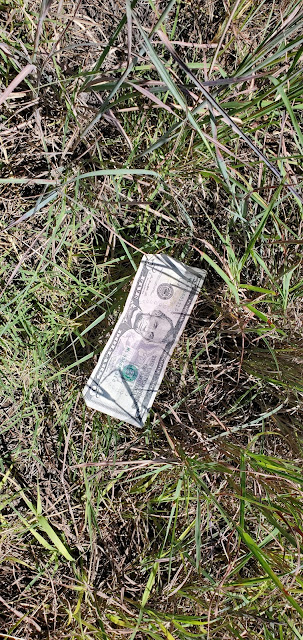10-GHz, Here I Come!
The limited rover category in the VHF contests represents a lot of fun and provides a great learning opportunity. It has inspired me to move even higher in frequency and to experiment with less expensive ways to get on the air. I ran across some excellent technical write-ups (to be shared later) that show how to get on 10-Gigahertz (GHz) very cheaply and still have decent results.
The basis for my first 10-GHz transceiver, or at least the transmitter part, lies in the use of HB-100 motion sensor modules. They are used by manufacturers to produce motion-sensing doors, lights, and other technologies and these modules can be obtained on Ebay for experimenters. I paid a grand total of $12 for those shown below. The picture shows each side of a module. The four square pads on the back of the modules are used for transmit and receive. This module is full-duplex!
I will use only the transmit side of one of the modules so it can be used with a parabolic dish. The steps from the webpage "QRV for 3 Euros on the 3cm band" will be followed. This allows for a 10-GHz Low-Noise Block (LNB) to be used on the receiver section and should produce better results. I have a used C-band LNB on the way from Ebay.
If the HB100 transmits at 10,369 GHz, and the LNB has a Lo of 9,750 GHz, the signal at 619 MHz comes from the LNB. Connect to this via a Bias-Tee a receiver that can receive in the range around 619 MHz, such as that RTl SDR dongle or other receiver such as my SDRPlay RSP-1. I just have to build a simple modulation circuit to send audio information and will probably build s simple code oscillator to provide audio, although an MP3 player or microphone could also be used.
Here are the links to the source documents:
https://translate.google.com/translate?sl=auto&tl=en&js=y&prev=_t&hl=en&ie=UTF-8&u=http%3A%2F%2Fhome.deds.nl%2F~knol%2FHB100%2F&edit-text=
http://physicsopenlab.org/2016/03/26/10-525ghz-microwave-motion-sensor-module/
http://www.ham-radio.com/sbms/presentations/Walt_Clark/DROplexer.pdf
I'll document my progress through further blog posts and upload some video when successful.
73 DE Korey--WA5RR
The basis for my first 10-GHz transceiver, or at least the transmitter part, lies in the use of HB-100 motion sensor modules. They are used by manufacturers to produce motion-sensing doors, lights, and other technologies and these modules can be obtained on Ebay for experimenters. I paid a grand total of $12 for those shown below. The picture shows each side of a module. The four square pads on the back of the modules are used for transmit and receive. This module is full-duplex!
 |
| HB-100 10-GHz Motion Sensor Modules |
If the HB100 transmits at 10,369 GHz, and the LNB has a Lo of 9,750 GHz, the signal at 619 MHz comes from the LNB. Connect to this via a Bias-Tee a receiver that can receive in the range around 619 MHz, such as that RTl SDR dongle or other receiver such as my SDRPlay RSP-1. I just have to build a simple modulation circuit to send audio information and will probably build s simple code oscillator to provide audio, although an MP3 player or microphone could also be used.
Here are the links to the source documents:
https://translate.google.com/translate?sl=auto&tl=en&js=y&prev=_t&hl=en&ie=UTF-8&u=http%3A%2F%2Fhome.deds.nl%2F~knol%2FHB100%2F&edit-text=
http://physicsopenlab.org/2016/03/26/10-525ghz-microwave-motion-sensor-module/
http://www.ham-radio.com/sbms/presentations/Walt_Clark/DROplexer.pdf
I'll document my progress through further blog posts and upload some video when successful.
73 DE Korey--WA5RR



Comments
Post a Comment